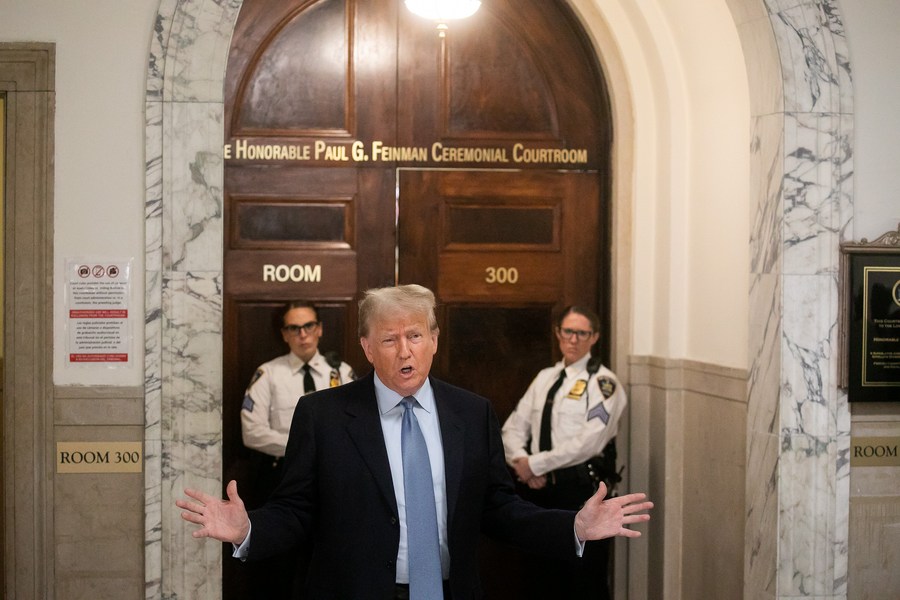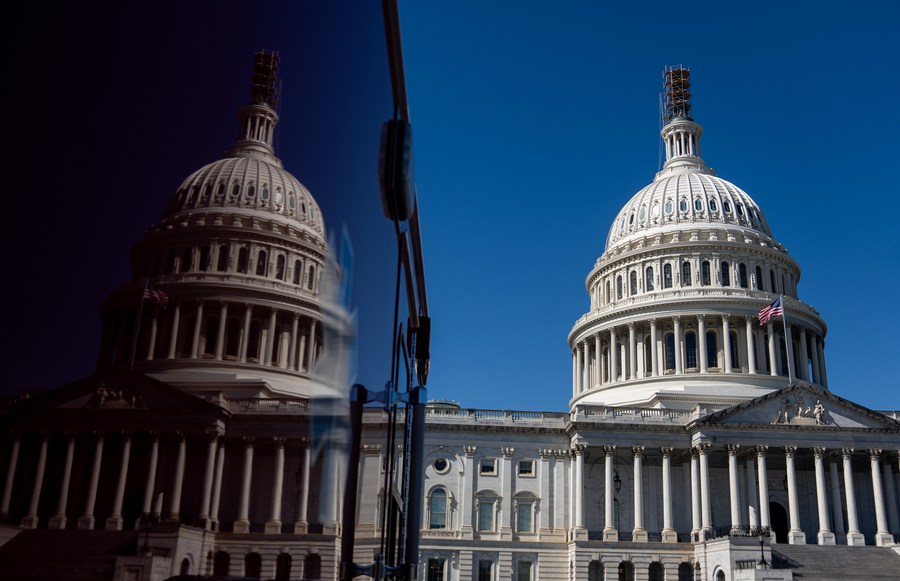Iowa caucuses kick off 2024 U.S. presidential race

Former U.S. President Donald Trump (Front) speaks to the media outside the courtroom during his civil fraud trial at New York State Supreme Court in New York, the United States, on Oct. 18, 2023. (Photo by Michael Nagle/Xinhua)
Despite Donald Trump's wide lead, some experts said the former president must get 50 percent to demonstrate to voters that he's capable.
WASHINGTON, Jan. 15 (Xinhua) -- The Iowa caucuses are set to officially kick off the 2024 U.S. election season later Monday, marking the first significant test of the candidates, who are jostling to be their party's presidential nominee for the general election.
Former U.S. President Donald Trump so far dominates the Republican event, being leaps and bounds ahead of other contenders for the GOP nomination.
On Monday night, Iowa Republicans will descend on community centers, churches and high school gymnasiums in this first event of the presidential primary season.
States can hold either primaries or caucuses as part of the presidential nomination process. Caucuses, which are political meetings, are run by the state party, while primaries are run by the state.
Iowa Democrats are also holding their caucuses on Monday night, but the party has made South Carolina its first nominating contest. Democrats are voting entirely by mail-in ballot and will release the results on March 5.
The final major poll, released 48 hours before the caucuses, found that Trump was far ahead of the other Republican candidates. Trump led with 48 percent of participants in the widely watched Des Moines Register poll.
Former South Carolina governor and UN Ambassador Nikki Haley took 20 percent, while Florida Governor Ron DeSantis stood in third place with 16 percent.

Ron DeSantis attends a swearing-in ceremony of the Florida governor in Tallahassee, Florida, the United States, Jan. 3, 2023. (State of Florida government/Handout via Xinhua)
Christopher Galdieri, a political science professor at Saint Anselm College, told Xinhua that the candidate to come out on top of the event "is almost certain to be Trump."
But he added that there are other factors to watch, such as Trump's margin of victory -- Does he dominate by 20 or more points, or does someone come in a close second?
Similarly, who comes in second? "Will it be DeSantis, who has bet everything on Iowa, or Haley?" Galdieri noted.
Moreover, Trump has a number of legal problems. He has pleaded not guilty in the criminal cases and has denied wrongdoing in the civil cases.
The former president maintained they are political attacks masked as legitimate prosecutions and mark a U.S. descent into what he calls a corrupt "banana republic."
A conviction in one of his trials could lead support for his campaign to decline, or he could make some sort of plea bargain that involved ending his campaign, for instance, Galdieri said.
Or the Supreme Court could rule that the Constitution's 14th amendment, which prohibits anyone who "engaged in insurrection" from holding office, bars him from appearing on the ballot this fall, Galdieri said.
"There's two races to watch," said Republican strategist David Kochel, as quoted in the Des Moines Register, a leading Iowa newspaper, and reprinted by MSN.
"Trump vs. his expectations -- because that will be how he's viewed, since it's now kind of assumed that he'll win. And then the other race is Haley vs. DeSantis. Who can make the strongest argument coming out of Iowa?"
Despite Trump's wide lead, some experts said the former president must get 50 percent to demonstrate to voters that he's capable.

This photo taken on Oct. 11, 2023 shows the U.S. Capitol building in Washington, D.C., the United States. (Xinhua/Liu Jie)
Evangelicals, who have been the religious group with the strongest views against abortion, are a key voting block in the Republican Party, and in the past have backed candidates that are more socially conservative.
In the past, GOP candidates have leveraged the evangelical vote, both during and after the Iowa caucuses, to gain traction.
This year marks interesting caucuses because evangelicals are not unified behind a single candidate, as they often are.
Iowa boasts around 752,000 registered Republicans, according to data from the state's secretary of state's office, as of early January. That comprises around 34 percent out of 2.2 million registered voters in the state.
In 2016, Iowa saw a record 187,000 people participate in the caucuses. That was around 29 percent of registered Republicans during that time. That year marked a significant rise over the two previous Republican caucuses, which saw around 120,000 voters turn out.
That year was also the year before Trump took the White House, and the former president energized voters like no GOP candidate in several years.
GOP strategists said higher numbers of participants will help Trump, "because he's got more available supporters to turn out," Kochel said.
However, snow and cold temperatures will likely dampen turnout.
Photos
Related Stories
- U.S. navy shoots down anti-ship missile fired from Yemen: Central Command
- Hot air balloon crash kills 4 in Arizona desert
- U.S. House, Senate leaders reach short-term spending deal to keep government funded until March
- Trump fraud trial concludes in New York following bomb threat to judge's home
- U.S. CPI accelerates to 3.4 pct in December amid rising shelter, energy prices
Copyright © 2024 People's Daily Online. All Rights Reserved.









